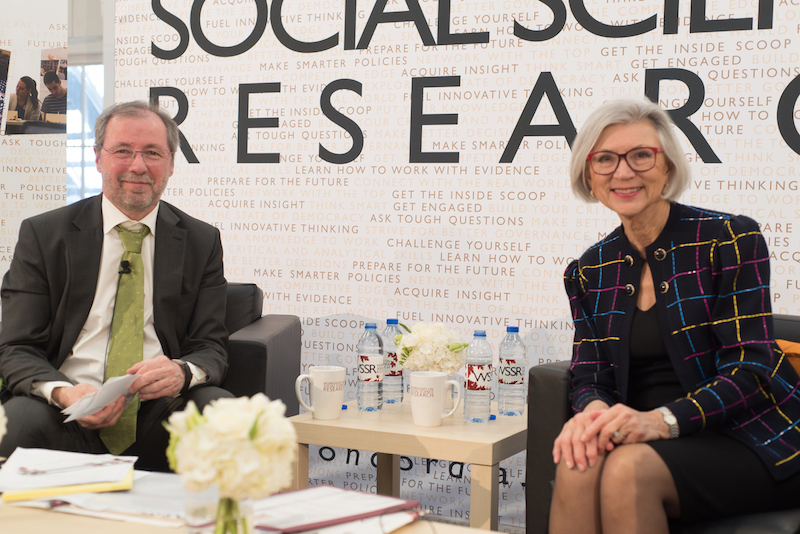Canada’s Supreme Court Chief Justice discusses pivotal moments in Canada’s history
Canada’s first female Supreme Court Justice Chief Justice Beverley McLachlin, was invited to speak at Concordia on March 16.
In commemoration of Canada’s 150th birthday, Concordia’s Workshops on Social Science Research (WSSR) organized the talk with McLachlin to discuss her five defining democratic moments in Canadian history. McLachlin, who is the longest-serving Chief Justice in Canadian history, addressed hundreds of students, professors and alumni at Grey Nuns.
“My first choice is, not surprisingly, the Confederation of Canada in 1867. The creation of the new dominion of Canada was the quintessential defining moment of the country,” McLachlin said. “These values established, from the beginning, Canada’s character, and a generation of people have expanded them.”
McLachlin identified three democratic values enshrined in the Canadian Constitution since its conception: democracy, federalism and respect for diversity and minorities.
She said the second defining moment in Canadian history was the decision of the judicial committee of the Privy Council during the Persons Case. “This case established that, in Canada, all citizens are equal,” McLachlin said. Prior to the Persons Case in 1929, only men were considered persons. The 1929 Supreme Court case ruled that women could also hold public office, she explained.
“The decision is seminal because it enunciated two principles that I believe are central to our Canadian democracy. First, all people are equally entitled to participate in democratic government. Second, that Canadian Constitution enhances Canadian democracy, and [the Constitution is] a living tree capable of growth and expansion,” McLachlin said.
The third defining moment was the patriation of the Constitution and the adoption of the Charter of Rights and Freedoms in 1982, McLachlin said.
“This moment signaled true independence for our country, and reaffirmed the principles of democracy, federalism and respect for minority rights inherent in the BNA Act in 1867, and constitutionalized individual and group rights for all Canadians,” she said.
“Thirty-five years later, I believe that most people would say that patriation of the Constitution was vital to our country’s democratic growth, and the Charter has stood the test of time,” McLachlin said. “The Charter has become part of the Canadian identity. Polls tell us that Canadians take pride in the Charter and see it as a fundamental defining element of Canadian democracy.”
The Chief Justice’s fourth defining moment was the recognition of the rights of Canada’s indigenous peoples.
“Section 35 of the Constitution Act 1982, for the first time, guaranteed the rights of Canada’s indigenous people,” she said. Section 35 provides constitutional protection to the Aboriginal and treaty rights of Aboriginal peoples in Canada.
“In the years that followed, court decisions fleshed out treaty rights and indigenous rights, through judicial practices, economic activity and cultural and religious practices.”
“The Supreme Court held that indigenous rights must be respected, in the pursuit of fair and just reconciliation between Canada’s aboriginal peoples and the descendants of Canadians who came later,” McLachlin said.
The fifth defining moment of Canadian democracy was the decision of the Supreme Court of Canada during the Quebec referendum in 1995. This decision was regarding if Quebec could unilaterally secede from Canada, under Canadian and international law.
According to McLachlin, the secession reference was a landmark case on whether states or provinces could unilaterally secede from a country. Countries around the world have looked at it as a reference case.
During the question and answer period, McLachlin said she would love to see more minorities in more government positions.
“Justices are chosen from the senior ranks of the practicing lawyers of the judiciary, but we have only seen large numbers of minority cultures coming into the judicial ranks in the last decades,” she said. “So I am confident that, as time passes, this deficiency will be remedied.”




